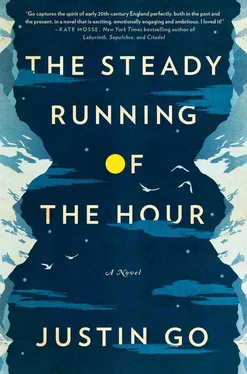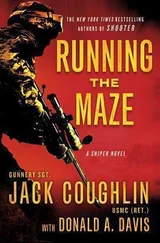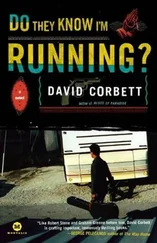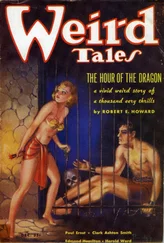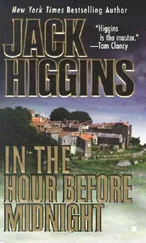Suddenly he turns and opens the trunk, removing a large cigar box inside. He looks at the box for a moment. Then he throws it into the fire. As the box burns away its contents are gradually revealed and now he sees the neatly bundled letters, the flowing blue-black script.
Ashley thrusts his hand in the fire and pulls out the bundle, smothering the flames with the towel. Smoke and ash hang wispy in the air. His singed hand throbs with pain. Ashley drops the half-burned letters into the trunk and examines the back of his hand. Most of the fine hairs have burned away.
Kneeling at the fire again, Ashley prods the logs with the poker, watching the remaining scraps of paper and cardboard incinerate. Then he sees the glittering silver cross, the purple-and-white ribbon flaring up. He lets the fabric burn away until only the cross remains. Ashley plucks the medal from the fire with iron tongs and drops it in the basin of water. The cross sizzles and sinks down. When it has cooled he puts it in his breast pocket.
Ashley dresses carefully. After he has put on his boots he feels sturdier, more soldierly. Mayhew clatters in again.
— Anything else, sir? Shall I take that small one?
— It’s empty, leave it here. I’ll meet you down at the lorry.
— Sir.
Ashley looks at the small trunk, the charred letters inside. He latches it shut and walks downstairs.
In the dining room breakfast has been set upon the table: a plate of boiled eggs, a long piece of buttered bread, a bowl of café au lait with the saucer placed on top to keep it warm. Ashley walks through the kitchen and the front parlor. All the rooms are empty. He goes back upstairs to the young girl’s room. Beside her bed there is a small walnut commode covered with a crocheted doily. He takes the metal cross from his pocket and sets it on the white lace. He walks out downstairs and shuts the front door behind him.
A truck waits on the dirt path, the engine sputtering puffs of smoke into the crystal air. Mayhew and the driver sit on the bumper, sharing a cigarette as they talk in low voices. There is a lawn before the house, but in this winter it is only scraps of frozen grass and dirt. Ashley gets into the lorry, taking his place on the bench seat beside Mayhew and the driver. The driver shifts the lorry into gear and they pass the water tower, turning onto the main road. Ashley scratches his chin. He may have nicked himself shaving. He turns to Mayhew, offering a cigarette.
— Mayhew, you remember the Empress, don’t you? That ghastly show in November—
— Of course, sir.
— You know they gave me the MC for that. God knows why. Made the show look less of a balls-up, I suppose. But I wanted to say. You saved my skin, Mayhew. I put you in for every medal in the mint, but nothing came through.
— That’s all right, sir. Didn’t expect nothing.
Ashley nods, passing Mayhew his lighter. — Another thing. You remember that Hun dugout, there was a sick officer in one of the bunks. I spoke to him for a bit. What I wanted to ask — do you remember what he looked like? Oddest thing. The other day I realized I may have met that fellow before, years ago—
— There weren’t no officer down there, sir. They were all dead, except the crazy ones. But there weren’t no officer.
Ashley looks at Mayhew, unsure if he is joking. But Mayhew’s expression is solemn.
— There was an officer, Ashley insists. He was from the Second Marine-Infanterie, I distinctly remember.
— I beg your pardon, sir, we didn’t talk to no one. We went down there, and they were all dead, so we come back up.
— Mayhew, I distinctly remember—
Ashley does not finish his sentence. He looks out the window at the snowy fields, a few houses with chimneys sending up faint wisps of smoke. If Mayhew does not wish to talk about it, so be it.

8 January 1916
Lake Ejen
Dalarna, Sweden
The light slants across the pine board ceiling. It must be afternoon by now. Minutes or hours pass, the same as ever, Imogen glancing at the envelope on the desk, then studying the woodgrain above her. She opens the novels and thin poetry volumes stacked beside the bed, gazing passively beyond tidy arrays of paragraphs and stanzas, then closes the books in turn.
At last she tosses the quilt from her body. She dresses warmly: a silk and wool combination, cashmere hose under her heaviest skirt, a Shetland vest and a knitted jersey. Imogen picks up the letter from the desk, already written and addressed, the envelope still unsealed with only the single sheet inside. She holds it for a moment, then carries it downstairs. When Eleanor sees Imogen’s clothing, her surprise is obvious.
— You’re going out?
— I thought I’d take a short walk. You don’t approve?
— Not at all, Eleanor replies. It’s a splendid idea, I’m only surprised, it’s been days since—
Imogen sets the envelope on the table and Eleanor’s eyes widen. Imogen’s voice is flat.
— Mrs. Hasslo needn’t make a special trip. Whenever she goes to town. It isn’t sealed, you can read it and seal it yourself.
Eleanor shakes her head vigorously.
— I wouldn’t dream—
— Read it, Imogen interrupts, then seal it. I’m going out now.
— Shall I come along?
— If you don’t mind, I’d prefer to go alone.
— Certainly. Only don’t wander too far—
— Just into the trees.
Eleanor forces a smile. She fetches Imogen’s cloak and wraps her sister’s neck in a muffler, tugging a fur hat low over her brow.
— It’s too much, Imogen protests, pushing the hat up. I’m dreadfully hot already.
— It’s arctic out there. And remember, if you go so far that I can’t see you from the house, I shall come after you.
Imogen creaks open the door. She steps from the stifling heat through the doorway, a tentative foot onto the ice-clumped doormat. At once her senses are overcome by the wonder of the outside world. The movement of the bracing air, its scent of pine and wood smoke from the chimney; the luminosity of the snowy surface, the light glinting from every crystal of every snowflake. What sublime richness to everything.
Imogen walks slowly toward the forest, the band of trees surrounding the clearing on all sides. How long ago had they razed this field to erect these houses — three hundred years? She tries to picture the appearance of such people, but the results are comic, peasants in mock-Renaissance garb, brawny woodsmen with handcarved pipes. Imogen’s boots sink down. The snow dusts the hem of her skirt.
Frederick if a boy , Imogen thinks. Charlotte if a girl.
Since the quarrel it had been quieter in the house. The sisters had not exactly reconciled. They had simply stopped talking about anything of consequence. They might discuss the weather or the food, Eleanor’s painting or Imogen’s afghan, any subject except the one that truly mattered. For eight days Eleanor had said nothing about the child, and though Imogen seemed tranquil enough, Eleanor had no way of knowing whether her sister had resigned herself to the plan or was simply plotting an escape. Only yesterday had it finally come into the open. They had been in the kitchen preparing vegetables for dinner while Mrs. Hasslo cleaned the bedrooms upstairs.
— Did you see the post? Eleanor had said. Mother sent you something. Can you believe I got three letters from Charles all at once, after a week with nothing? He’s been out and back to Sinai again with the major, but of course he can’t say much about it. He did have some ideas about the names—
Читать дальше
